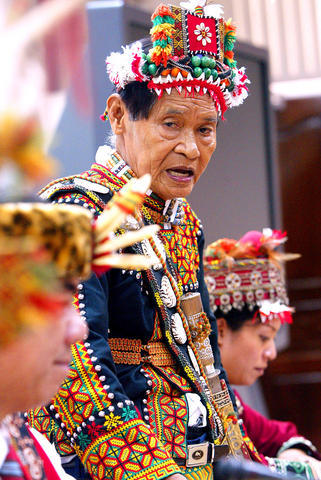Descendents of "Princess Bannen" of the Rukai tribe yesterday called the popular myth about the princess an unauthorized rewriting of a true story in the tribe's history.
Dozens of Rukai tribesmen joined the protest at a press conference held at the legislature yesterday.
In recent years, the myth of Princess Bannen has not only been used in a computer game, but also turned into a pop song.

PHOTO: CNA
One of the popularized versions of the Princess Bannen story recounts how a beautiful Rukai princess named Bannen fell in love with Prince Hundred-Pacer Snake and wanted to marry him.
Bannen's parents were angry since they didn't want their daughter to marry a snake. However, they couldn't directly refuse the marriage for fear of angering their ancestral spirits, because Rukai people believed themselves to be descendents of the hundred-pacer snake.
Therefore, Bannen's parents listed several difficult tasks for the prince to complete before granting their permission for the marriage.
The prince completed them all successfully. On the wedding day, Bannen followed the hundred-pacer snake into the sacred Talopalin Lake and was never seen again.
For the Rukai tribesmen and Bannen's descendents, the love story element is completely an outside creation.
"The real name of Princess Bannen was Limuasa. The real story was that Limuasa fell in love with a man from another tribe -- which was unacceptable for the Rukai at the time," said Dale Vag, an Amis man who married a descendent of Limuasa.
"The story happened about 260 years ago, and for the Rukais at the time, marriage with someone from another tribe was shameful," said Lakuduvia Muni, a 13th-generation descendent from Limuasa's family.
To agree to the marriage, Limuasa's parents posed several challenges to the man.
After he had completed all the challenges, permission to marry was granted, Muni said.
As agreed, the man married Limuasa. But since Limuasa felt guilty toward her parents, the couple committed suicide a few days later by the Talopalin Lake, Muni said.
"No one consulted us when they rewrote the story, which was disrespectful," Muni said. "I'd like to ask the government to help preserve tribal culture -- which includes our right to tell the story."
At a separate venue, Council of Indigenous Peoples Minister Icyang Parod said he supported Muni's request.
He also said that the council has drafted a bill specifically aimed at protecting traditional and original Aboriginal stories and music.
The bill is currently in the legislative backlog, Icyang added.

An essay competition jointly organized by a local writing society and a publisher affiliated with the Chinese Communist Party (CCP) might have contravened the Act Governing Relations Between the People of the Taiwan Area and the Mainland Area (臺灣地區與大陸地區人民關係條例), the Mainland Affairs Council (MAC) said on Thursday. “In this case, the partner organization is clearly an agency under the CCP’s Fujian Provincial Committee,” MAC Deputy Minister and spokesperson Liang Wen-chieh (梁文傑) said at a news briefing in Taipei. “It also involves bringing Taiwanese students to China with all-expenses-paid arrangements to attend award ceremonies and camps,” Liang said. Those two “characteristics” are typically sufficient

A magnitude 5.9 earthquake that struck about 33km off the coast of Hualien City was the "main shock" in a series of quakes in the area, with aftershocks expected over the next three days, the Central Weather Administration (CWA) said yesterday. Prior to the magnitude 5.9 quake shaking most of Taiwan at 6:53pm yesterday, six other earthquakes stronger than a magnitude of 4, starting with a magnitude 5.5 quake at 6:09pm, occurred in the area. CWA Seismological Center Director Wu Chien-fu (吳健富) confirmed that the quakes were all part of the same series and that the magnitude 5.5 temblor was

The brilliant blue waters, thick foliage and bucolic atmosphere on this seemingly idyllic archipelago deep in the Pacific Ocean belie the key role it now plays in a titanic geopolitical struggle. Palau is again on the front line as China, and the US and its allies prepare their forces in an intensifying contest for control over the Asia-Pacific region. The democratic nation of just 17,000 people hosts US-controlled airstrips and soon-to-be-completed radar installations that the US military describes as “critical” to monitoring vast swathes of water and airspace. It is also a key piece of the second island chain, a string of

The Central Weather Administration has issued a heat alert for southeastern Taiwan, warning of temperatures as high as 36°C today, while alerting some coastal areas of strong winds later in the day. Kaohsiung’s Neimen District (內門) and Pingtung County’s Neipu Township (內埔) are under an orange heat alert, which warns of temperatures as high as 36°C for three consecutive days, the CWA said, citing southwest winds. The heat would also extend to Tainan’s Nansi (楠西) and Yujing (玉井) districts, as well as Pingtung’s Gaoshu (高樹), Yanpu (鹽埔) and Majia (瑪家) townships, it said, forecasting highs of up to 36°C in those areas